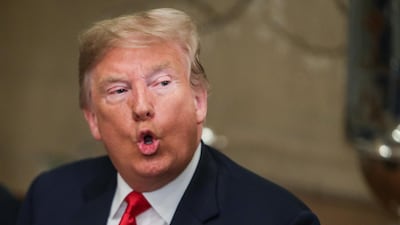The Trump administration has been living a contradiction in the Middle East. On the one hand it seeks to contain Iran's influence, while on the other Donald Trump has been adamant about withdrawing American forces from Syria, where Iran is currently exercising its power most aggressively.
Mr Trump's defenders at home should be disconcerted, but they haven't been. Many of them are supporters of Israel, which feels most threatened by Iran's ambitions. One would have thought that they would push the president to adopt a more interventionist regional role. That they haven't can be put down to the fact that they believe Israel's military power, not America's, is the main mechanism to contain Iran.
Mr Trump does not appear to disagree. Last May, he sent letters to the leaders of several Arab states urging them to bear more of the burden in containing Iran. He has repeated this theme several times. While Mr Trump may be a devoted promoter of Israel, everything about his attitude suggests he would have no problem if the Israelis also picked up the slack. This Israel has done to an extent, through its repeated bombardment of Iranian or allied outposts in Syria.
_______________________
Read more from Opinion
The commodification of global military protection could be cataclysmic
It might not seem like it, but the world has never had it so good
_______________________
However, does Mr Trump’s willingness to subcontract management of power relations in the Middle East to Israel make much sense? Even if the Israelis were to tacitly collaborate with other states in the region, their primary instrument of thwarting Iran is the use of force. Yet containment involves more than military action, and the Israelis have next to no regional influence beyond their own borders.
In other words, down the road depending on Israel is a recipe for greater regional instability and fragmentation. If Israel is at the forefront of Iran’s containment, the prospect of war will greatly increase. In that context the region could become much more polarised, creating openings that, paradoxically, benefit Tehran, as Arab societies such as Syria, Lebanon, Iraq, the Palestinian territories, and perhaps even Jordan, become places where the Iran-Israel rivalry plays out.
The irony of all this is that Mr Trump is very much adopting an approach to the region that approximates that of his predecessor, Barack Obama. The current president's backers loathe Mr Obama, but they also seem strangely indifferent to the reality that Mr Trump is just as keen as he was to compel the Middle East to manage its own affairs without constant involvement by the United States.
_______________________
Read more from Opinion
Reinstating internet will bring a semblance of normality to Yemen
The rescue of the Old Library is a moment to rejoice
_______________________
In his long interview with Jeffrey Goldberg of The Atlantic in April 2016, Mr Obama had hinted at such an ambition, when he urged the Saudis to "share" the Middle East with Iran. This may contrast sharply with what Mr Trump has said, but there is an underlying similarity. Mr Obama regarded such a step as a way of bringing about a balance of power that would allow the United States to disengage from the region. Mr Trump may rail against Iran, but he also would like to see Israel curb Iran's power so that Washington can head for the exits.
Mr Trump’s allies would argue the difference is fundamental. Whereas Mr Obama sought a balance in the region and empowered Iran through the conclusion of a nuclear deal, Mr Trump seeks the victory of Israel and Iran’s Arab rivals. Perhaps, but how likely is such a scenario? Some Gulf states have disengaged from Lebanon and Syria, are of two minds on Palestine and Jordan, and face a complicated situation in Iraq. They are in only slightly better a position than Israel when it comes to limiting Iran’s sway in several Arab states.
So, in the absence of an Israeli-Arab triumph over Iran, Mr Trump is not so very different than Mr Obama. Both men want America out of the Middle East; both men view the solution in a greater reliance on regional parties; and both men believe that the United States has simply spent too much money over the years to sustain its dominance in the region, with few tangible returns.
But Mr Trump’s solution is not any better than Mr Obama’s was. The former president only heightened instability by refusing to play the role of regional stabiliser after 2009, while his opening to Iran alarmed American allies. Mr Trump hasn’t done that, though shifting regional supervision onto Israel’s shoulders is just as likely to provoke a strong Arab backlash if Israel assumes that it now has a blank cheque to wage wars everywhere to inhibit Iran.
There often seems to be an attitude in the United States that Israel can be a deus ex machina in the Middle East, a state whose actions can cut through the region's irresolvable problems. While Israel has military power, Iran can play on the conflicts within Arab societies to reinforce itself. Worse, it can only thrive in those environments that Israel will destroy to hurt Iran. Israel can devastate the region's frail states, but Iran is in the better position to make the most of this.


